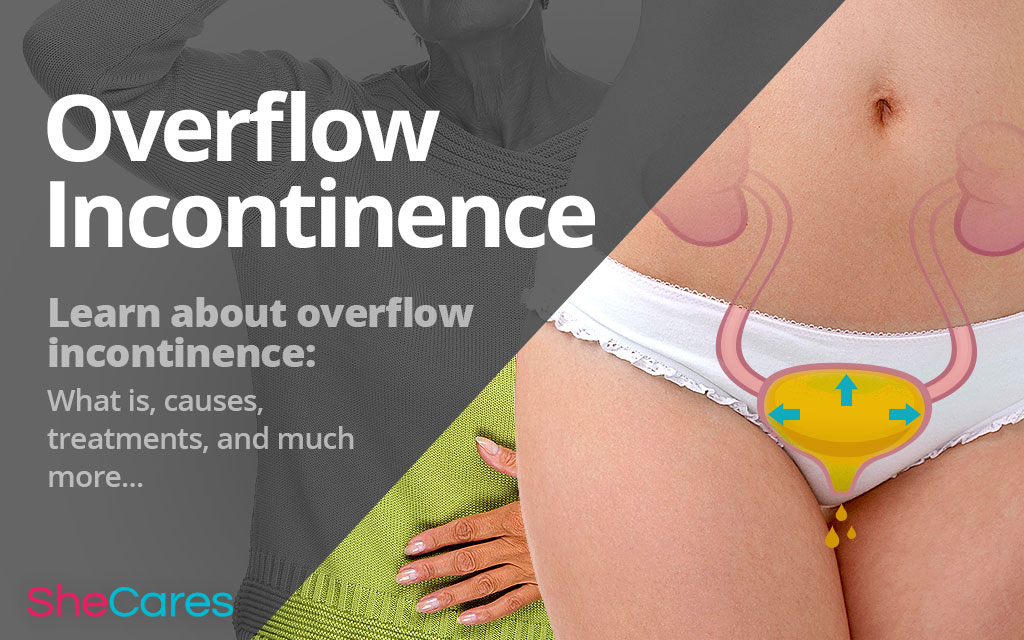Many women will suffer from some type of incontinence during their lifetime, and this is more likely when they approach their menopausal years. Overflow incontinence in particular affects older women, and it can be a consequence of many different factors. Information about the causes of this condition, as well as guidance regarding how it can be treated, can be valuable when coming to terms with overflow urinary incontinence.
What Is Overflow Incontinence?
Overflow incontinence refers to urinary leakages that occur because the bladder is never fully emptied. This could be due to a range of factors, but it causes the bladder to retain urine even after you have gone to bathroom to relieve yourself. If urine is left in the bladder, it will take less fluid to refill it, and so an overflow of liquid can sometimes leak. You may also find that when you pass urine, it is expelled at a weak and slow rate.
Causes of Overflow Incontinence
Overflow incontinence can happen for reasons related to the actions of the bladder and the signals between the bladder and the brain. Many women who suffer from this condition find that they don't experience a sensation of the urge to urinate, but merely discover that they have leaked when a wet patch becomes apparent. Common causes of this disorder are:
Nerve damage
Many health problems and other factors can cause damage to the nerves that influence the urinary system. Childbirth, infections in the brain, diabetes, and accidents that damage the brain or spinal cord are just some possible causes of nerve damage.
An obstruction
Sometimes, overflow incontinence is caused by an obstruction in the urinary tract - such as a cyst - which stops the urine from completely flowing out, meaning the bladder is never fully emptied.
Underactive bladder
This condition means that the relevant muscles do not contract as often as they should, causing the bladder to swell. This enhanced size can stretch the urethral sphincter muscle, causing it to open slightly and leak urine.
Medications
Some prescribed drugs - such as anticholinergics, sedatives, and antidepressants - can cause overflow incontinence because they affect the bladder's ability to contract, stopping it from releasing the full amount of urine.
Treatments for Overflow Incontinence
This type of incontinence is unfortunately one of the hardest to treat, as the reasons behind it are complex. Depending on how severe your symptoms are, your doctor may prescribe the following:
Bladder training
Many women benefit from developing a basic schedule regarding when they consume fluids and when they pass urine. Being aware of your habits can enable you to manage them better, and you can even train your bladder somewhat so that you feel the need to void it at the same times each day. It can also involve trying to lengthen the time between visits to the bathroom.
Pelvic floor exercises
Also known as Kegel exercises, these can be helpful for generally strengthening the bladder muscles. Although this may not influence your urination pattern, it should enable you to pass more urine when you do void and help prevent leaks.
Electrical stimulation
Your doctor may suggest this method if other treatments are ineffective. It involves the use of electric pulses to stimulate the nerves that affect the action of the bladder and urethra, thereby instigating urination.
Medications
Some women may be take prescribed drugs that influence the relevant nerves and muscles; these can be used to relax the bladder and prevent spasms. These often have side effects such as a dry mouth, heart palpitations, dizziness, and insomnia.
This type of incontinence can be upsetting and difficult to deal with, particularly because you may not realize when it will affect you. To avoid embarrassment, you may find it reassuring to use protective implements such as incontinence pads, which can absorb any accidental leaks.
Sources
- National Health Service UK. (2016). Urinary incontinence. Retrieved May 4, 2017, from http://www.nhs.uk/Conditions/Incontinence-urinary/Pages/Introduction.aspx
- National Institute of Diabetes and Digestive and Kidney Diseases. (2012). Bladder Control Problems & Nerve Disease. Retrieved May 4, 2017, from https://www.niddk.nih.gov/health-information/urologic-diseases/bladder-control-nerve-disease
- University of Maryland Medical Center. (2012). Urinary incontinence. Retrieved May 4, 2017, from http://www.umm.edu/health/medical/reports/articles/urinary-incontinence
